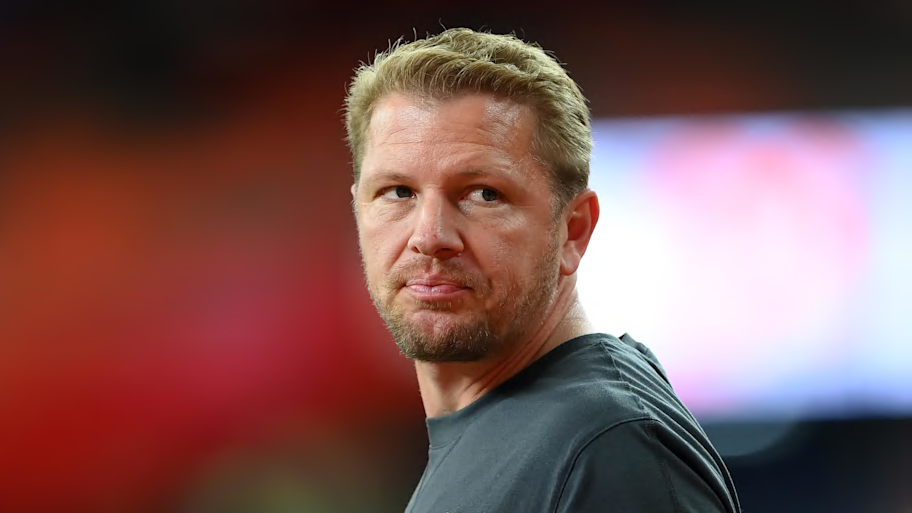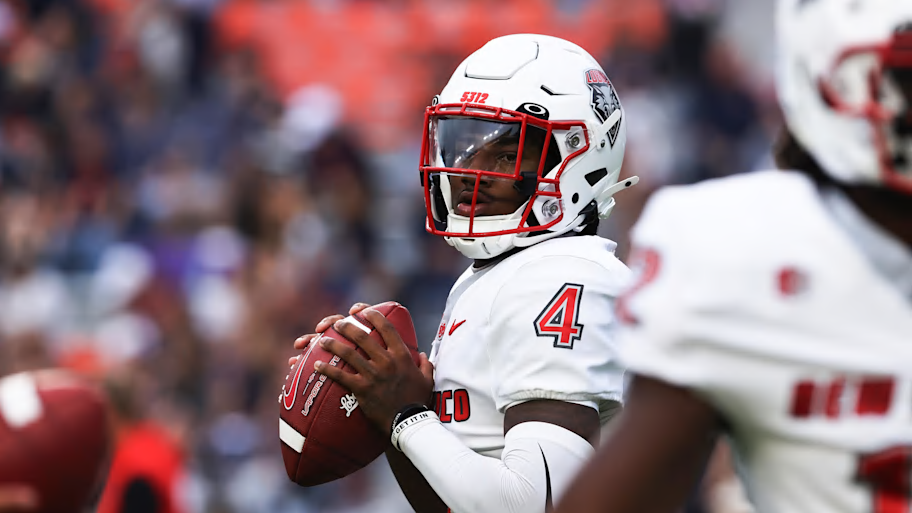The end of the regular season is often a turbulent time for most college football programs.
There’s the onset of finals on the academic side, the confluence of the transfer portal opening and arrival of the early signing period on the recruiting front, the coaching carousel spinning to maximum velocity and the general craziness that crops up as Thanksgiving gives way to an even more festive period outside of the football calendar.
Few programs understood how unsettling this moment can be last year more than the New Mexico Lobos. In the week after the team made the long trek back to Albuquerque following a loss to the Hawai'i Rainbow Warriors that ended their hopes of a bowl game, the program pretty much scattered into the wind. Over just a handful of days—and really just a key stretch of 48 hours—most of the major figureheads involved in a promising turnaround campaign were suddenly on their way out of town almost as soon as they had arrived.
The Lobos’ losses at the time, however, wound up being the Beehive State’s gain.
Head coach Bronco Mendenhall quickly took charge over the rival Utah State Aggies the first week in December. Just beforehand, offensive coordinator Jason Beck was announced at the same position with the Utah Utes. Devon Dampier, the first New Mexico quarterback to ever earn first-team All-Mountain West honors, eventually made his way to Salt Lake City, too.
While all navigated the hectic ending to their time together in different ways, the latter two reuniting figures to have a far larger impact on the coming college football campaign given the step up to Power 4 competition in the coin-flip Big 12. Though both downplayed the outside perception they were any sort of package deal, both coordinator and quarterback are thrilled with how things played out and seemingly in even more lock step than during their brief stint with the Lobos.
“I knew he was going to go into the portal before he knew I had other job opportunities,” says Beck, a former BYU Cougars assistant and quarterback just down the road from his new school. “I never thought about it in terms of [being a package]. I’m very appreciative that Devon did come to Utah because he’s such a good player, such a good person, and it’s awesome to work with him and be able to continue together.
“If I look at it from Devon’s perspective, I can see why it’s a good decision because you’re going with somebody you trust, and they have a year of experience working with you to help you to continue to develop versus starting that process over. I think it’s just kind of a win-win all around.”
Despite being the last to publicly find a new home, Dampier actually was the first to consider leaving during a meeting with Beck and Mendenhall shortly after the conclusion of the regular season. The Arizona native was one of the more high-profile quarterbacks to enter the portal during the first window, having racked up just shy of 4,000 yards of total offense in his first full year as a starter to make the Lobos an entertaining team to follow along amid a slew of wild games that often took place late at night.
“Those coaches, they’re great people who want the best for me. So I already had that comfort factor to tell them that moving on was something I was interested in doing. Things worked out at the end of the day with Coach Beck being able to come here,” Dampier says. “I used the transfer portal to, I think, choose a route that’s going to allow me to develop more and allow me to reach the league. That’s always been my biggest goal.”
Utah would be overjoyed if that wound up being the case, as the signal-caller is not only a dynamic option behind center—he averaged 7.5 yards per carry last season—but the potential answer at a position which has been snakebit for the program in recent years.
In 2023, the Utes lost incumbent starter Cam Rising to a knee injury in the Rose Bowl against the Ohio State Buckeyes which compounded the program’s slide from conference contender into a one-trick pony that had to scratch and claw to gain yardage with the forward pass while leaning on their defense to win games most of the time. Walk-on Bryson Barnes had alternated at quarterback with Nate Johnson to middling success while the bottom fully fell out last season.
Rising returned to the lineup after months of speculation for the team’s opener but was injured during a Week 2 victory over the Baylor Bears. True freshman Isaac Wilson was forced into action but was not ready for the moment, something that became obvious once Rising returned—only to suffer what turned out to be a career-ending injury in a loss to the Arizona State Sun Devils. Eventually Wilson was knocked from the lineup too, as was his backup, and fifth-stringer Luke Bottari had to finish out the year in one of those everything that could go wrong, did, scenarios.
The Utes wound up losing seven in a row during their maiden voyage in the Big 12, the program’s longest losing streak since 1986 and a constant source of frustration for head coach Kyle Whittingham both before and after offensive coordinator Andy Ludwig stepped down midseason.
If there was any upside to such an offensive malaise in Salt Lake City, it was largely in the fact that it paved the way for a fairly seamless reboot on that side of the ball. Whittingham, along with head coach-in-waiting/defensive coordinator Morgan Scalley, cast a wide net during their search for a new coordinator (and quarterback) late last year, but seem to have found a perfect pairing.

“It’s easier than a year ago doing it in New Mexico and the reason I say that is being able to have Devon come with me—it’s like you’re having a returning quarterback. All the other pieces are different and new, but that [quarterback] piece is a huge one,” says Beck, who had the fourth-best offense in FBS by yards per game last year. “With the skill spots, there’s a ton of other transfers between the receivers, running backs, every other spot that touches the ball. But I’ve been through it a couple of times now, in the last four years I’ve been a part of that [roster flip] three different times. I’ve got the flow and best practice methods of how to go about getting that up and running, but just having the quarterback in place was such a huge benefit.”
“All the verbiage is the same and obviously we’re adding a few new things, but the base point has remained the same. It’s pretty easy for me to know what’s going on and the main part is just teaching other guys,” says Dampier before letting out a chuckle. “I try not to be too bossy because I know what it’s like to have a boss out there. But I’m definitely letting them know.”
It helps that there’s added continuity to help spread such knowledge well beyond that of a player’s perspective. Wide receivers coach Micah Simon and offensive analyst Koy Detmer Jr. also made the move from New Mexico, and there are more familiar faces beyond that.
New Utes running backs coach Mark Atuaia, as an example, was on staff with Beck under Mendenhall with the Virginia Cavaliers and arrived from the Washington State Cougars along with the team’s new tailback, star sophomore Wayshawn Parker.
Yet the biggest reason for optimism about the offense moving forward might be the one area of the team that is largely a holdover from the disappointing group that limped their way through last year: the offensive line.
Assistant Jim Harding has spent over a decade within the program handling things up front and just might have his most talented group ever with the two-deep virtually intact from 2024. That includes right tackle Spencer Fano and opposite number Caleb Lomu in particular, a pair of bookends who are already viewed as likely first-round NFL draft picks (if not top-15 picks) next spring and a key selling point for the New Mexico transplants in joining up in the same spot.
“The biggest part was the linemen we were able to keep here,” Dampier says. “To play behind a top-three-ranked NCAA O-line was huge.”
“It’s as good as an O-line as I’ve been around,” Beck says. “The line is not putting handcuffs on you that, at other places, you’re working around those deficiencies and what they can do. So that was a huge positive.”
As solid as things are up front and under center, the question mark for Utah making a leap on offense will largely come down to the skill positions which have mostly been revamped via the transfer portal. Even those within the program are interested to see how things evolve on that front, starting with the opener at an old Pac-12 foe, the UCLA Bruins.
Dampier, to his credit, has been relentless in trying to develop chemistry with many of the new faces around the offensive meeting rooms throughout the Utah football facility. He’s widely praised for his optimism and attitude almost as much as his abilities on the field, which he showcased enough of to inspire an outlook you normally wouldn’t expect from a unit that was ranked 102nd in the country at 23.7 points per game.
“Trust me, we’re going to score points,” the quarterback says. “I think the Big 12 is a great conference and I think we’re also a conference where there’s a lot of teams that are able to truly fight for that one and two slot to possibly get that playoff run. I truly believe we’re one of those teams and I think it builds the fuel in us after last year. No one likes the feeling of last year—we don’t even talk about it. That’s not us.”
Thanks to a couple of imports from a surprising spot far off the usual path on the college football atlas, Utah certainly will look much different offensively this season and have to hope that last year’s frantic ending that brought it all about can give way to a new era of optimism for a program pinning to get back to a place of conference contention.
More College Football on Sports Illustrated
This article was originally published on www.si.com as Utah Football Aiming for Revamped Offense With New Mexico Additions.
